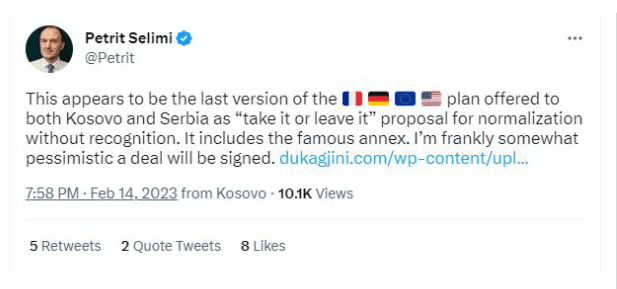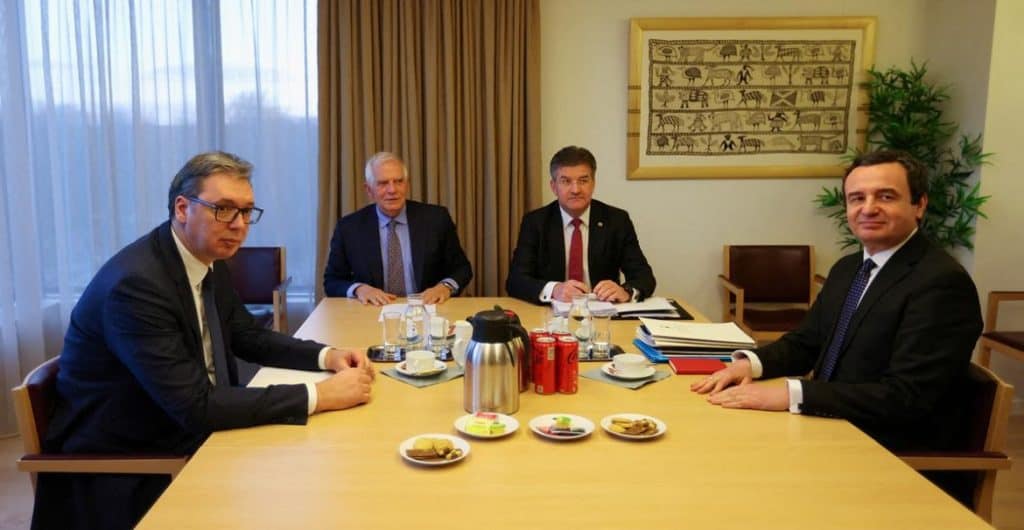By Dragan Vitorovic
In a relatively well-balanced text written by Alex Kliment for GZeroMedia,[1] the situation related to Kosovo* is described as unstable and implies the possibility of aggravation of political risk in the short-term.

Most of the media outlets located at the decision-making centers of the European Union, depict Serbia as a destabilizing counterpart of the negotiation process between Belgrade and Priština. This perspective reflects on the Serbian political and economic connections with Russia and China, something that is hardly seen in a positive light in the West. Even more, the media occasionally reports on the publicly known agreements and political arrangements between Serbia and China falsely describing them as covert, which does not contribute to political stability in the region.
Kliment’s article provided links to the media-covered so-called Franco-German plan for the resolution of the frozen conflict, citing the Albanian media and Twitter profile of the former foreign minister of Kosovo*, attempting to provide a certain level of verifiability. [2] While the plan was allegedly leaked, and the European Union decision makers are in haste to pre-attempt any additional security disturbances in Europe, the leaked document looked like it represents a rough draft version. It is more probable that the document is re-typed, after obtaining a photo from third-party sources.

The Official Document Presented
On 27 February 2023, high representatives of Serbia and Kosovo* met to discuss the plan, characterized as a comprehensive, detailed, and carefully drafted document that engaged all 27 EU members. However, the document, while attempting to establish a feasible and long-term solution, opens more space to speculate what would be the consequences of rejecting it. The well-informed West-based media stated that the document is carefully written on behalf of all members of the EU. However, it is not highly probable to be the final version of “normalization between Serbia and Kosovo*.”
Additionally, the allegedly leaked document even had more details given in the Annex to the Agreement than the officially uploaded document accessible on the webpage of the official website of the EU [4].
President of Serbia, Aleksandar Vučić, in his speech on Serbian television after the negotiations, stated that the process was challenging and that he presented a six-page document explaining the official standpoint of Serbia related to the Franco-German plan. The mentioned Serbian reaction in writing is not publicly available, since the Serbian part refrained from an irresponsible approach to sensitive diplomatically mediated negotiations.
A well-informed guess is that the Serbian delegation insists on the completion of the agreements already agreed upon in Brussels, a decade ago, such as the foundation of the Association of Serb Municipalities (Zajednica Srpskih Opština, ZSO in Serbian), while questioning the Articles 1, 2 and 4 of the Franco-German document.
The negotiations would continue on 18 March in Skopje.
(Disclaimer:
Kosovo* – “This designation is without prejudice to positions on status and is in line with UN Security Council resolution 1244 and the International Court of Justice Opinion on the Kosovo declaration of independence”.
The PDF document, following the article, underlines the typing and spelling errors in yellow. The part of the document marked red emphasizes the politically sensitive constructions and proposals.)
[1] https://www.gzeromedia.com/kosovo-15-years-later-a-dangerous-limbo
[2] https://www.dukagjini.com/wp-content/uploads/2023/02/Agreement-2.pdf
[3] https://twitter.com/Petrit/status/1625555129146478615?s=20
Author: Dragan Vitorovic
(The views expressed in this article belong only to the author and do not necessarily reflect the views of World Geostrategic Insights).







